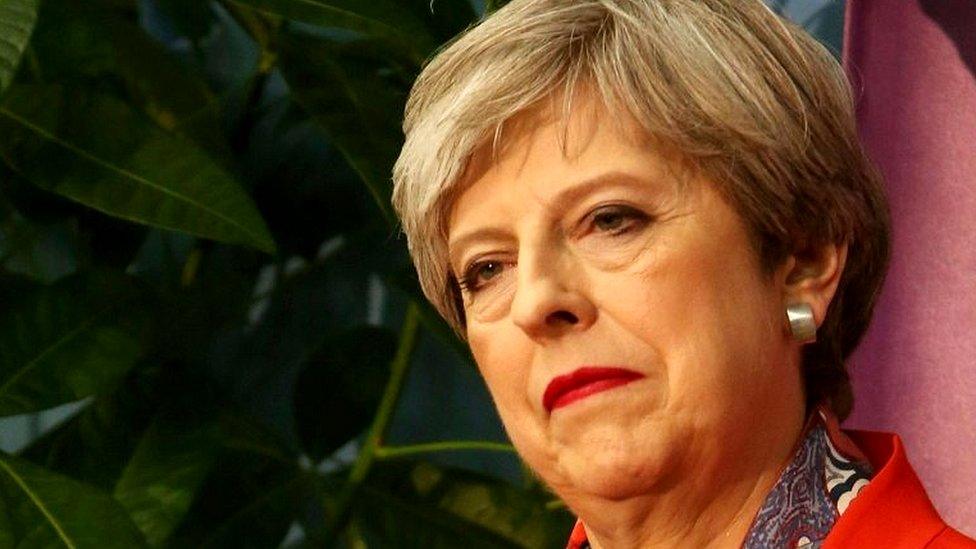How Midlanders narrowed it down to a hung parliament
- Published
Electing a hung parliament takes some some doing
For good or ill, our "first past the post" system has a habit of producing disproportionate majorities one way or the other. It's a narrow statistical window through which the results must pass to end up with neither fish nor fowl. Supporters of the status quo argue that whatever its undoubted faults, it does at least usually produce stable governments.
So how have we managed to defy this logic in two of the last three general elections, especially since Theresa May was luxuriating in 20%-plus opinion poll leads less than two months ago when she called the election?

You are luxuriating one minute and the next, the Midlands has its say
Two prime factors stand out.
First, the electorate is generally much more volatile than it was, say, 20 years ago, when the parties could sense genuine solidity in their support. Tony Blair had known for many months that he would gain the keys to No 10 on 1 May 1997. The very idea of a "landslide" conveys this image of rock-like certainty. But with the demise of so many of the old political, employment and social tribalism has come something much more plastic and unpredictable.
Second, the more the contest becomes a two-party (rather than a multi-party) affair, the more you get a a pulley effect between them. If the leading party's support dips by, say, five percent, the gap between it and its main rival narrows all the faster when the bulk of those five percent switch straight from the one party to the other, rather than distributing themselves between a range of smaller parties.
Midlands Marginals
Our part of the country has traditionally been more of a two-way fight between Labour and the Conservatives than most other regions. Even in their heyday between 2010 and 2015, the Liberal Democrats could amass no more than three MPs out of our 63 seats.
So you may have thought, as I did, that the Midlands marginals we keep talking about were set to play an even bigger role in deciding the outcome this time.
In the event, with very few exceptions, our swing seats refused to swing. Even those that did delivered conflicting, contradictory verdicts: the Remain-supporting constituency of Warwick and Leamington went from the Conservatives to Labour, while Leave-supporting Walsall North and Stoke South did the exact opposite.
But dig more deeply into the numbers, and an even more fascinating picture emerges of the Conservatives' missed targets here. For Theresa May it must be tantalising. So near and yet so far.
Her party's tally of 318 seats leaves it eight short of an overall majority. But if you add together Labour's majorities in all those eight most marginal 'holds' which stood between Mrs May and victory, you get a combined total of just 786.
If she had persuaded just 400 more people to support her party in those two-way marginals, she would have been safely across the finishing line.
Scalps
What's more, two of the three tightest results are right here.
In Dudley North, Ian Austin's Labour majority over the Conservatives was just 22 votes. And in the Conservatives' prime Midlands target, Newcastle-under-Lyme, the arch-Remainer Labour MP Paul Farrelly clung on by just 30 votes.
On the other side of the equation, though the margins were not quite so narrow, Labour was certainly not far away from claiming significantly more Tory scalps here than just the one.
Whatever next?
So how do voters in those key seats view the possibility now of another early election - especially the Keele University students who are believed to have played a part in Mr Farrelly's success?
And what's the mood in Dudley North, where Labour's Ian Austin seems to be making a habit of surviving recounts? In 2010 he returned with a majority of just 649.
Our political reporter Emma Thomas has been revisiting these hotly-contested battlefields to see whether they are now getting ready for yet more excitement.
You can see her report in this weekend's Sunday Politics Midlands, when I will also be joined by the Conservative MP for Cheltenham, Alex Chalk, and West Midlands Labour MEP, Neena Gill.
And I hope you can join us too, in our usual 11:00 slot, on BBC One on Sunday 18 June 2017.